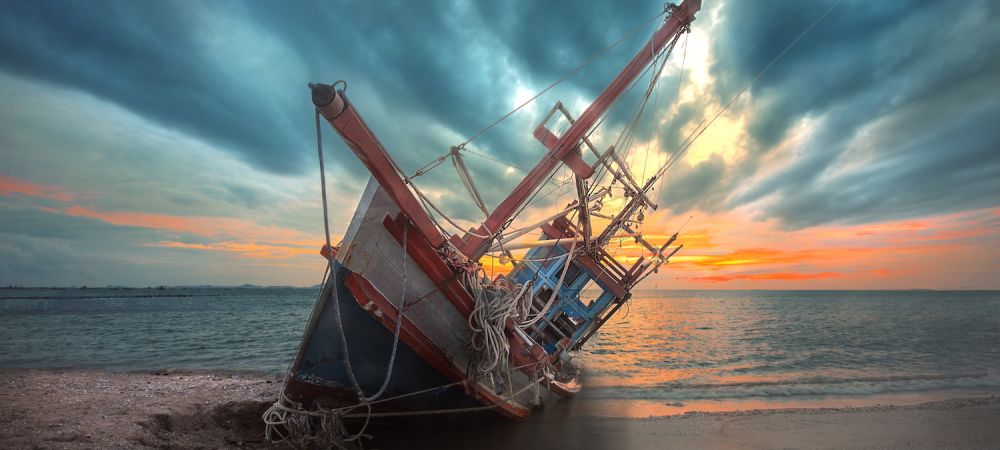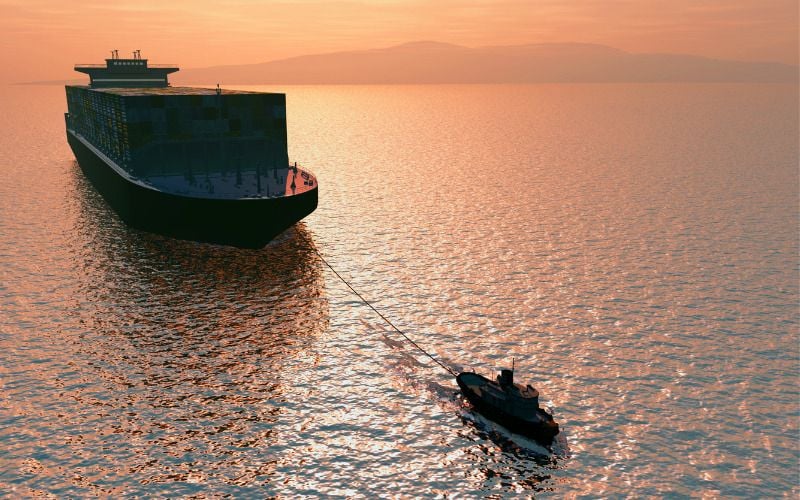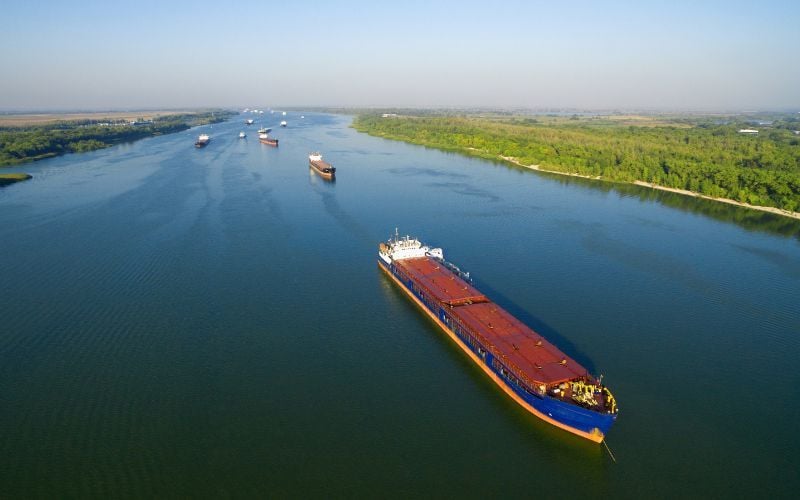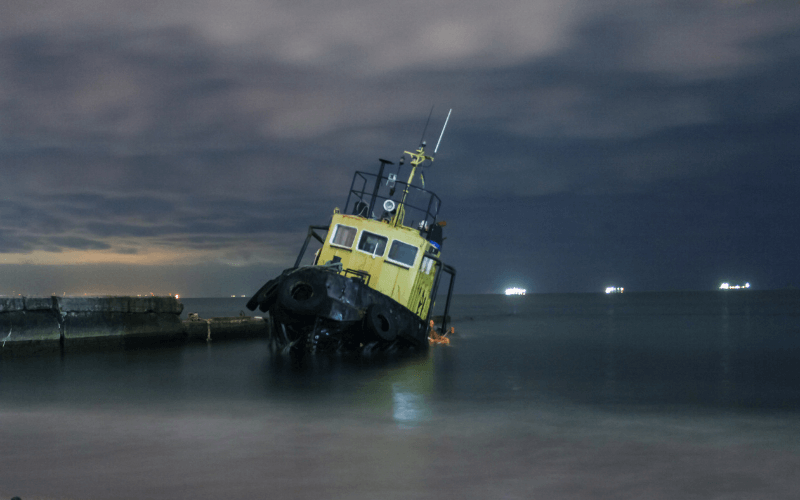
Claims of Unseaworthiness
The term “unseaworthy” may conjure up images of an old rusty boat or a hole in a ship’s hull. However, in legal terms, the concept of unseaworthiness, and claims of unseaworthiness, covers more than just the structural seaworthiness of a vessel.
In maritime law, an unseaworthy vessel is defined as any ship, boat, barge, or vessel with unsafe conditions on board for its crew. Unseaworthiness doesn’t necessarily mean that a vessel is about to sink when it sails out to sea. In most cases, an unseaworthy vessel is one that causes injury to its crew as the result of the negligence of the ship’s owner.
What Does “Unseaworthiness” Mean?
Seamen have special protections under a part of maritime law called the Doctrine of Unseaworthiness. This doctrine specifically applies to negligence caused by unseaworthy vessels, and the basic underlying idea is that a ship owner has an absolute duty to provide a crew with a vessel that is seaworthy — it is a basic right of all maritime workers.
A seaworthy vessel is one that is designed, built, maintained, and crewed to navigate waters, and provides seamen a safe living and working environment, as well as the equipment and training to do their job. If a vessel doesn’t meet these requirements, it’s considered to be unseaworthy, and injured workers can make claims of unseaworthiness.
Similar to Jones Act negligence, unseaworthiness can take many forms, including:
- Slippery substances on decks, leading to slips and falls
- Worn out equipment or fixtures, e.g. the rubber feet at the bottom of a ladder worn or missing
- Lack of proper safety equipment, or worn-out safety equipment
- Tools or equipment breaking with normal use
- Crewmembers who haven’t been properly trained
- Excessive working hours
- Insufficient supervision
- Absence of safety procedures
- Violation of a Coast Guard regulation
Any crew member of a vessel who has been injured by while aboard an unseaworthy ship can make a claim of unseaworthiness. The Jones Act provides for damages in cases in which the owner or employer of a vessel is negligent and that negligence causes an injury, and this includes claims of unseaworthiness.
Doctrine of Unseaworthiness vs. Jones Act
Although there is significant overlap between the Doctrine of Unseaworthiness and the Jones Act, each provides its own remedies for seamen under maritime law.
The first major difference is that unseaworthiness claims are made against the owner of the vessel, while claims under the Jones Act are filed against the injured seamen’s employer.
There are also differences related to the damages an injured seaman can recover with a claim of unseaworthiness versus a Jones Act claim. While the Jones Act provides specific limited damages in cases of negligence, the claim of unseaworthiness permits injured seamen to recover any damages traditionally available under general maritime law.
This is significant because a claim of unseaworthiness, entitles a maritime worker, or their surviving family members in the case of wrongful death, to all remedies available under the Jones Act and then some.
Jones Act claims are limited to past and future lost earnings, medical expenses, and pain and suffering. Also, in Jones Act death claims, surviving family members may recover only for the seaman’s conscious pain and suffering, and monetary losses related to the death, e.g. loss of financial support for dependents.
A claim of unseaworthiness goes further, permitting surviving family members to file their own claim for their own loss, e.g. loss of consortium.
What Compensation is Available for Claims of Unseaworthiness?
Injured seamen who make a claim of unseaworthiness can recover the same damages available for Jones Act negligence, which includes:
- Lost earnings and lost earning capacity,
- Past, present, and future medical expenses; and
- Past, present, and future pain, suffering, and mental anguish.
Additionally, a seaman may claim unpaid past medical expenses and medical expenses likely to be incurred in the future.
The statute of limitations for a claim of unseaworthiness is three years from the date of the accident or injury, similar to Jones Act claims.
However, it’s important that you don’t waste time in contacting a knowledgeable maritime attorney who can assess your case and inform you of your legal rights. The sooner you speak to an attorney, the sooner they can start preserving important evidence that will assist your claim.
Proving an Unseaworthiness Claim
The burden of proof for claims of unseaworthiness is different to Jones Act claims. Under the Jones Act, an injured maritime worker has to prove their employer was negligent and that the negligence contributed to their injury. To make a claim of unseaworthiness, injured seamen don’t have to prove their employer knew about the unseaworthy condition of the vessel or that their employer was negligent. There simply has to be some state of the vessel that made it unseaworthy and that contributed to the injury.
Knowing what kind of claim to make under maritime law when you’ve been injured, and whether the Doctrine of Unseaworthiness applies to you, isn’t always clear. Because the term “unseaworthiness” is so broadly defined, it’s important to speak to an experienced attorney at Montagna Maritime Law who knows the ins and outs of maritime law, including claims involving the Doctrine of Unseaworthiness and the Jones Act, and how these laws may apply to your case.
Free and Confidential Evaluation of Your Case
If you would like to find out more about your legal rights after suffering an injury at work, take advantage of our free consultation. You can learn more about what benefits you may be entitled to and how our experienced maritime attorneys can help. We handle all our cases on a no win, no fee basis, which means you will pay attorney fees only if we are successful in getting you compensation.
"*" indicates required fields


















